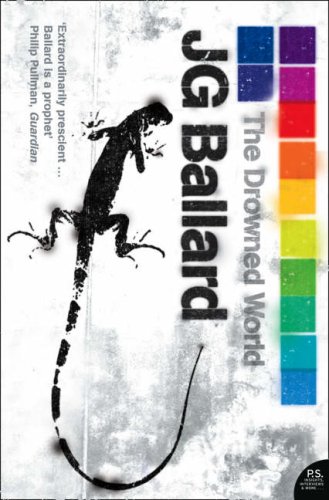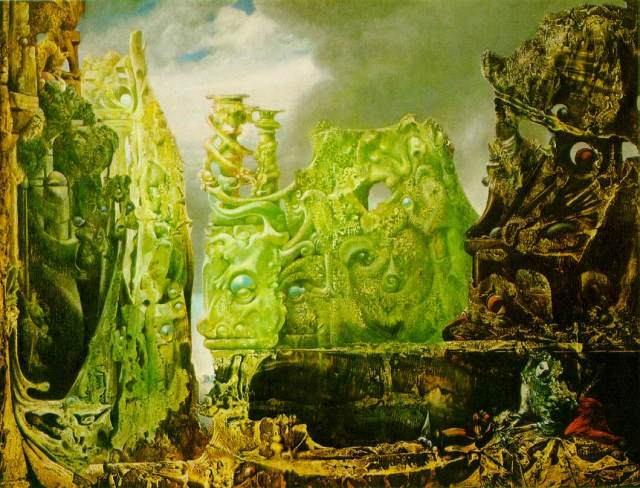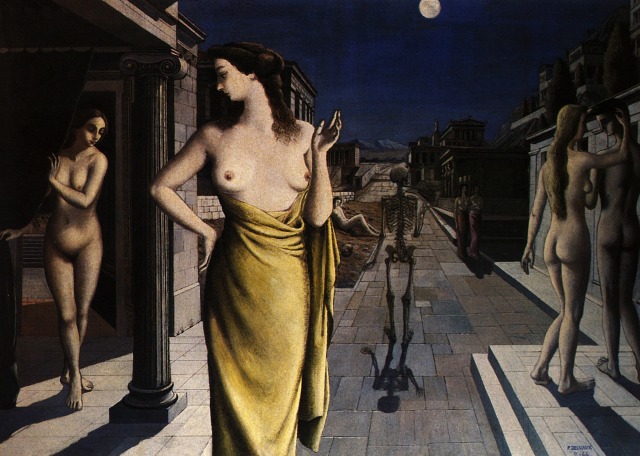Ballard is an author I’ve always wanted to read, but I was never sure which novel to pick first, so I postponed reading him again and again. Why I finally picked The Drowned World is an interesting story because it mirrors the content of the book in an uncanny way.
I keep on dreaming about the city I’m living in. In my dreams it doesn’t look like the actual city but is completely overgrown, drowning in vegetation, all the streets look like rivers of grass. It’s not hot in this city and it’s not necessarily a post-apocalyptic setting, but it’s a completely altered landscape. Curious to see whether anyone ever wrote something like this, I googled a few key words, which eventually led me to Ballard’s The Drowned World. What an amazing experience to find an echo of my own dreams and imagination in this book. Furthermore I have always been very fond of surrealist paintings and the idea of archetypes makes sense to me; both are important elements in this novel.
The Drowned World is set in a post-apocalyptic world, or, to be more precise, in a submerged, overgrown, tropical lagoon that once used to be the city of London. Solar radiation melted the ice-caps; the land was flooded. The heat and the floods have changed the climate completely.
Dr Robert Kerans, a team of researchers and an army unit map the flora and fauna of the different lagoons. While the team wants to move north, Kerans and a few others want to remain south. They have begun to dream strange dreams, which are a sign of their devolution. It seems as if they were regressing; the changing landscape has affected their psychology.
As Bodkin, one character, says:
“Well, one could simply say that in response to the rises in temperature, humidity and radiation levels the flora and fauna of this planet are beginning to assume once again the forms they displayed the last time such conditions were present – roughly speaking the Triassic period.”
Because the landscape once used to look like it does now, the subconscious of the people reacts:
“But I’m really thinking of something else. Is it only the external landscape which is altering? How often recently most of us have had the feeling of déjà vu?, of having seen all this before, in fact of remembering these swamps and lagoons all too well.”
The premise is that everything the species has ever experienced is stored in the subconscious of each one of us and with the devolution, the memories are triggered:
“The brief span of an individual life is misleading. Each one of us is as old as the entire biological kingdom, and our bloodstreams are tributaries of the great sea of its total memory.”
I thought this was highly fascinating and it does make sense. Maybe not as literally as Ballard states it, but it’s sure that landscape influences us, it even influences our deep psychology, and it’s entirely possible that the memories of the species are stored in our subconscious as well.
The novel is not very action-driven but there is conflict. At first the army wants everyone to leave and move up north, but they finally give in and depart. Kerans, Bodkin and Beatrice Dahl – Kerans enigmatic lover – stay behind. They know they will not be able to survive for long but before they can decide on their future Strangman and a group of pirate-like characters appear. They are looters. They travel from lagoon to lagoon and rob all the submerged buildings of their riches. What nobody knows at first is that they dry up the lagoons and towards the end of the novel, we see the silt- and algae-covered London emerge from the waters. Another uncanny moment.
The end is predictable, but that doesn’t make it any less powerful. It reminded me a lot of Joseph Conrad’s Almayer’s Folly.
My edition of the novel contains an interview with Ballard and a short essay by him. In these two texts he underlines that surrealism, dreams and the fact that he grew up in Shanghai were important in the writing of this book. Max Ernst and Paul Delvaux are mentioned in the novel and have influenced Ballard’s imagery. As a child he witnessed how Shanghai was flooded every summer and that as well has contributed to create the images in the novel.
Max Ernst
Paul Delvaux
The Drowned World is not an easy book because it’s heavy on descriptions. As a lot of what he describes felt familiar from my dreams and my travels to Asia, it was easy for me to see what he painted with words, but I suppose it could be a challenge if you prefer action driven books. If you have never experienced the humid heat of the tropics it’s equally hard to imagine how that climate could affect you. That’s why I compared it to Conrad. The way Westerners are affected by the tropics is quite explicit in Conrad’s work, while it is much more implicit in Ballard’s book. Comparing the two is interesting.
I know that I wasn’t able to do this book justice. I think that is because I liked it too much. That may sound weird but that’s how it is. The Drowned World is one of the most fascinating books I’ve ever read. I loved the premise and the imagery; it was so powerful, reading it felt like lucid dreaming. It’s making my best of this year list, and maybe even my all-time favourite list.




What a curious way to find a book, or to have it find you. I’ve read some Ballard but not this one. The Shanghai angle, though, will likely send me to the library to pick it up. And as I grew up south of the kudzu line in the U.S., the landscape already seems familiar.
It was rather uncanny. I even wrote a small piece based on my dream and then I discovered this. And dreams are a major theme.
It helps if you’ve experienced humid heat and wild vegetation. I hope you’ll review it. I’d be interested to read your thoughts.
Wonderful review, Caroline! It is interesting that you remembered your dream of the submerged city and googled it and discovered Ballard’s book. That is so awesome! I think if you had met Ballard some time both of you would have had a lot to talk about. The idea of the entire memory of our species being stored in the subconscious of each and every one of us is quite fascinating. It was interesting to know about Ballard’s influences while writing this novel. The two paintings that you have shared are quite interesting. It is nice to know that this is one of your favourite books of the year and maybe one of you alltime favourites. I had a ‘Shanghai phase’ when I read many books on Shanghai. I wanted to read Ballard’s ‘Empire of the Sun’ at that time, but I somehow missed it. Now after reading your review, I want to read ‘The Drowned World’ first. Thanks for this wonderful review.
Thanks, Vishy. It’s a stunning book and certainly spoke to me on more than one level even before I read it. 🙂
I would have loved to talk to him. I don’t say that very often about authors but in his case it’s really true.
Interesting about your Shangha phase. Can you share some of your finds? One that stood out particularly?
I think you’d like the Drowned World. Such powerful imagination. But it’s a slow book.
That is wonderful, Caroline. It makes me think of Marlen Haushofer’s ‘The Wall’. After I read your review, I knew I had to read it. And when I read probably around ten pages, I knew that it is going to be one of my favourite books. I will look for Ballard’s book. Am getting a feeling that I might discover one more favourite author this year 🙂
Some of the books that I read during the Shanghai phase and which I can remember now were these – ‘Shanghai’ by Christopher New (story set in Shanghai during the early to the middle 20th century – it is a sprawling epic and I liked it very much), ‘Shanghai Baby’ by Wei Hui (it is about the adventures of a young Shanghai girl who has a succession of lovers – it got some good reviews, but I didn’t like it that much), ‘Shanghai : Electric and Lurid City’ edited by Barbara Baker (it is an anthology of works on Shanghai and it has excerpts from letters, historical accounts, novels, stories and poems on Shanghai – quite a nice book). I also remember ‘The Painter from Shanghai’ by Jennifer Cody Epstein, but I don’t think I have read it. I also read ‘The True Story of Ah Q’ by Lu Xun (Lu Xun was a Shanghai-based writer in the early 20th century, but I don’t think the story is set in Shanghai).
I really hope you will like Ballard. It’s such an intense book.
Thanks a lot for the “Shnaghia list”. The only book I have is Shanghai baby but I haven’t read it. A friend of mine read it and didn’t like it at all. That put me off.
Shanghai: Electric and Lurid City sounds very interesting. I have to look that up. Thanks for mentioning it.
I definitely haven’t read enough Ballard (though I believe I have this on Mount TBR). I have however started his complete short stories and they are quite amazing – so inventive, visual and thought-provoking. He was certainly one of a kind.
Thanks Kaggy, for mentioning the short stories. They will go on my wish list right away.
This was my first but not my last Ballard. It’s such a vivid book.
Lovely “origin” story. Uncanny.
It’s probably 15 years since I read this but I remember it all clearly. Ballard is a powerful imaginative presence once you’ve read him. A lot of his ideas (like the regression one here) are powerful because of (or despite?) the extremes he takes them to.
It really was uncanny. Also because I’m familiar with the content of some of his books but this one has escaped my attention until now.
I don’t think that all of his books are for me. I saw the movie “Crash” for example and really didn’t like it.
I remember my father mentioned “Concrete Island” and he thought it was quite powerful as well.
It’s facsinatig that he used the same concept again. One could say it’s like his philosophical system.
Crash is strong stuff alright. The film is relatively tame compared to the book.
His late 90s stuff – Cocaine Nights, Super Cannes – is good, albeit you’d want to sread them out as the approach becomes repetitive. At the more sci-fi end I really liked his collection Vermillion Sands.
I think you have to be a committed Ballardian to try some of his stuff like The Atrocity Exhibition.
*spread them out* that should be…
I’d keep this more extreme work for last. I’m not sure I’m in the mood for it right now.
But I will return to him. Maybe the short stories Kaggy mentions would be good.
Well, with this positive review in mind, I suggest reading his other works — The Burning World is in a similar mold. High-Rise is also fantastic… And, if you are truly in a New Wave ultra experimental mood, The Atrocity Exhibition — although, I think you’ll hate it.
Thanks, Joachim, I’ll keep them in mind. I have a feeling that the Atrocity Exhibition wouldn’t be my favourite. At least not from what i know of it so far.
What an interesting way to find a book, Caroline. Very cool.
This is not my genre, as you probably know, but I might be willing to make an exception for this one. Thanks for a great review.
Thanks Carole. It was rather strange to see my inner images echoed like this. 🙂
It’s not an easy book though. It wants a lot of attention but I thought itvwas fascinating.
I’ve seen Empire of the Sun but have yet to read Ballard–not sure I’d start here though, in spite of your enthusiastic review.
I’ve just watched Empire of the Sun . . . Spielberg is Spielberg. He even manages to make tacky POW movies.
I don’t know which would be the ideal starting point for you.
I saw Leroy’s comment. I have Cocaine Nights here.
Outstanding commentary Caroline.
Occasionally a fictional story will mesh with some of my imaginings and I find that it is a very odd experience, uncanny as you commented.
I now really want to read Ballard as he sounds right up my ally.
Thanks, Brian. I was so sure you’ve read Ballard. If not I’m pretty sure he’s for your. I think you’d find this one especially interesting.
It has a lot of what you like. Strong imagery, philosophical aspects.
Seeing your inner life echoed is uncanny.
He’s not a very literal writer, he’s sometimes referred to as a writer of slipstream fiction – fiction which uses SF concepts but to explore psychology more than technology. The actual premise needn’t be wholly credible, because it’s not the point.
This isn’t actually a bad one to start with. It’s got some incredibly arresting imagery, particularly for me the descent into the flooded London planetarium.
He seemed to write each book three times. There are three apocalypse novels for example. Well, I’m not sure there was another Crash, but I could be wrong on that.
Concrete Island would probably be a good follow-up choice, because it’s a good example of what he went on to do. This is as close to straight SF as he gets (and it’s not that close). Later works are more our world seen through a cracked mirror.
Thanks, Max, that’s interesting to know. I was never really sure about slipstream. It explains why I liked him so much. Some SF can be too heavy on technology and explaining everything. I’m more interested in psychology.
If he writes every novel three times it’s as if he explores a concept from different angles.
I might try Concrete Island next. On a list of 50 best SF novels I saw Ubik mentioned. That’s more SF, I’d say, right?
I totally get your statement that you weren’t able to do this book justice because you like it too much. I still haven’t written a review on Great Gatsby for that very reason. I love that book and can’t review it properly to show how much I love it so I haven’t done it. Probably won’t
This one sounds interesting. Sometimes I do like a lot of description. Will have to add this to the list.
Sometimes it’s a bit like spoiling the memory to write a bout a book you liked very much.
I wouldn’t be surprised if Ballard was on your 1001 list. I think youd find it interesting. It’s one of those books when you like it, you like it very much but if you don’t . . .
Max reviewed The Great Gatsby not too long ago. I’d like to read it again.
This sounds interesting–I sort of like dystopian fiction, though it has been ages since I read any (a good one and similar in tone is I have Waited and You Have Come, which I read several years ago–an uncomfortable read). I have always wanted to read Ballard’s Empire of the Sun–quite a different book than this one. I will have to look for this–and the books that defy being written about are usually the best ones!
It has such stunning imagery, hard to describe realy. I think it’s a sign that a book is great when it leaves you without words.
I’ll have to look for “I Have Waited . . . ” Thanks.
I just watched Empire of the Sun but I’m sure the book is much better. He also wrote a memoir which tempts me. Both might be readalong chocies, come to think of it.
I would love to read this! This sounds very interesting. I always enjoy books with amazing imagination like this. A lot of description when told in an interesting way never bored me, just like the lord of the rings.
I love the cover!! very unique.
Btw you have an unusual dreams.
It was an unusual dream. 🙂
It’s not a breezy read, it’s quite slow but for me it was like wathicng a movie. I kept on thinking the whole time “I’d love to see the big cities flooded” It would be quite horrible, of course, but an amazing sight.
I have been there. In 2007, more than half Jakarta waa flooded. Many students couldn’t come to school.
When it happens in real life, it’s not that funny, I assume.
Pingback: Best Books of 2013 | Beauty is a Sleeping Cat